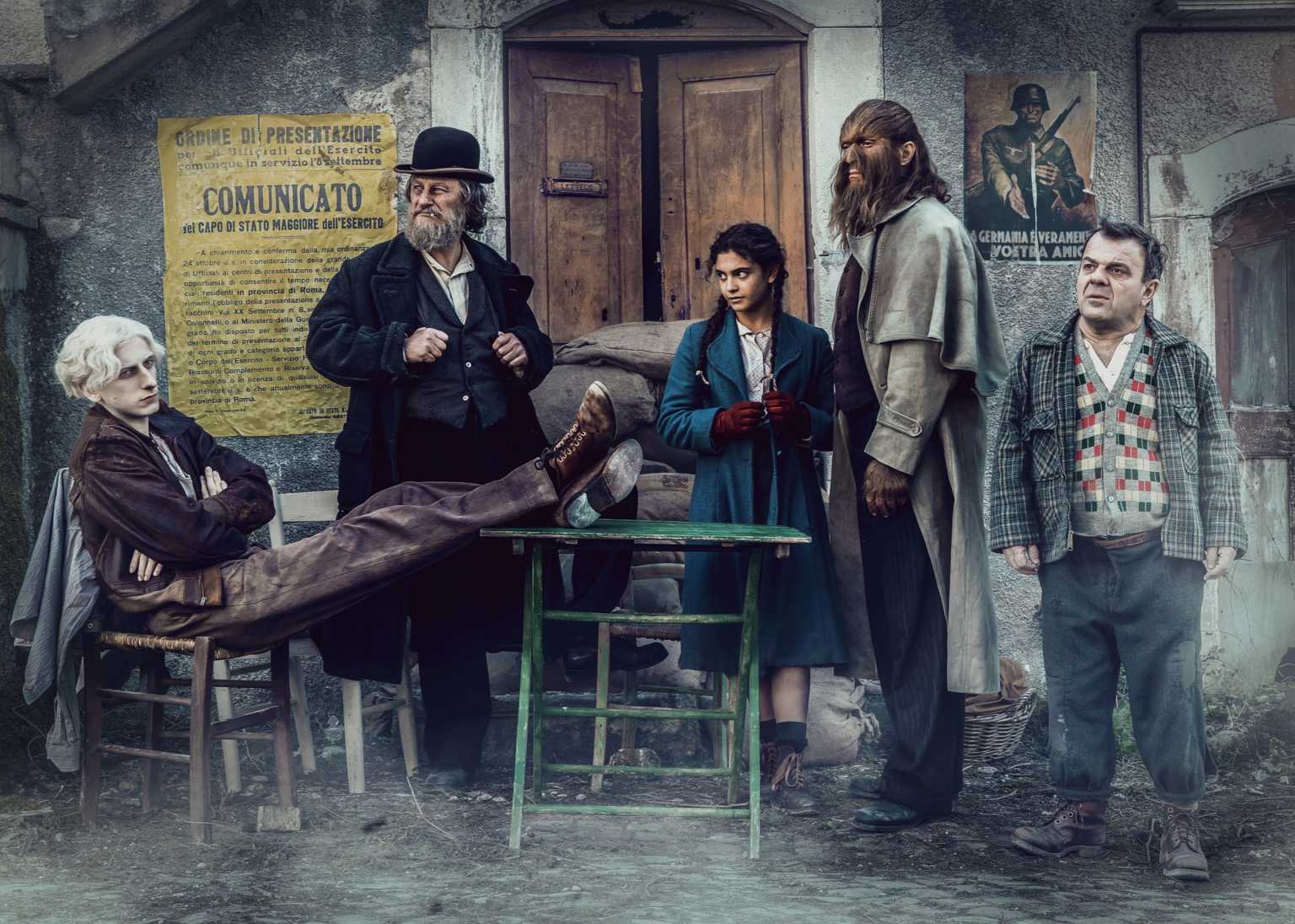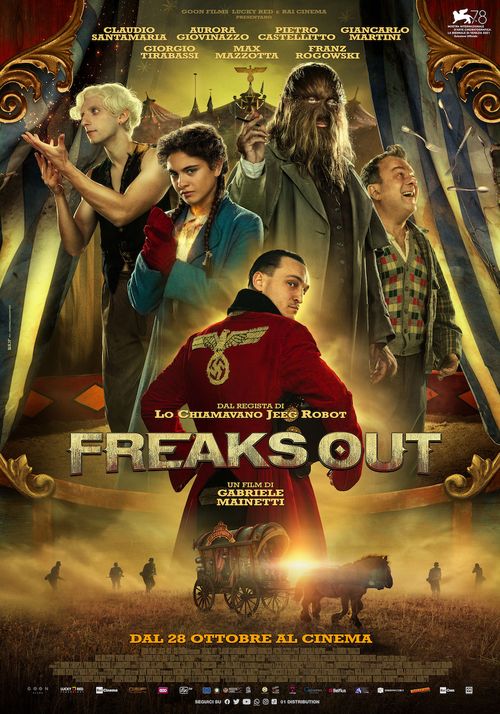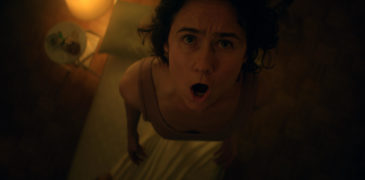
Sometimes a movie packs so much content and creativity that it’s easy to forgive any flaws along the way. Freaks Out, the latest effort from They Call Me Jeeg Robot director Gabriele Mainetti, is one of those creations: a unique blend of historical drama, epic superpower fantasy and tightrope-walking circus adventure which will satisfy genre diehards looking for a beam of energy and enthusiasm. Benefitting from stunning cinematography, a dazzling color palette and dastardly sense of humor, it eschews its 140 minute-long runtime and rewards the viewer at every step. As such, it’s quite easy to get lost in the movie’s inventive world and overlook some of its groan-inducing developments.
Matilde, Fulvio, Mario and Cencio are four circus performers who find themselves without a circus in the movie’s opening minutes. When Israel, their benefactor, is taken by the occupying Nazi forces, the remaining four debate going to America or joining the massive Nazi-friendly Zirkus Berlin. Meanwhile, Franz, a high-ranking Nazi officer, sees recruiting them as the only hope of winning the war. The catch? All of them possess superpowers: Franz knows the Reich will eventually lose the war because he’s seen it in his visions. Matilde has electrical powers she can’t quite control. Fulvio, the hirsute gentle giant of the group, is stuck with super-strength. Cencio routinely talks to insects and Mario is a young Magneto in the making.

From the start, the movie impresses with its keen eye for detail, and its storytelling which throws the viewer headfirst into the fray, relying on the “show, don’t tell” principle. The audience infers that Franz is an oracle because he performs Radiohead’s Creep on the piano and draws sketches of smartphones (he also seems to be a Marvel fan). He copes with the burden of his gift through his ether addiction. Just by seeing Fulvio and Mario, their Morlock-like problems become apparent. Fulvio is the one who really needs to know German because he has to fast-talk his way out of dangerous situations, so of course he does. When the movie does tell instead of showing, it’s really answering some burning questions, like Franz not being to join the army due to having six fingers or Matilde having killed someone in the past. The assured storytelling is matched by the stunning cinematography, camerawork, editing, color grading and special effects.
Freaks Out uses some themes from the X-Men universe (xenophobia, discrimination, society’s distrust towards individuals with deformities), but because of the nature of the superpowers its four protagonists possess it feels more like an Italian version of The Umbrella Academy. It also borrows the colorful magnetism of movies like Alex De La Iglesia’s The Last Circus or Terry Gilliam’s Imaginarium of Doctor Parnassus, mixing it with the irreverence of Inglourious Basterds or even Iron Sky. There is a pool scene which recalls the very first episode of Marvel’s Legion, and if one is looking for similar works of literature there is Theodore Sturgeon’s The Dreaming Jewels (about circus performers working together to escape evil) and Italo Calvino’s The Path To The Spider’s Nest. Perhaps most of all, this is an offbeat festival gem just waiting to be discovered by wider audiences, just like the Serbian 2008 film Tears For Sale.
The historical aspects work in the movie’s favor, giving the fantasy elements a robust framework to subvert and disrupt: there are frequent Nazi raids in which soldiers take every male to an unknown fate. There is a resistance group called the Crippled Devils which uses guerilla tactics against the Germans. Proof of Nazi dominance is everywhere, and the entire world responds to it through eruptions of violence. Unrelenting and a bit on the cartoonish side, the film’s violence can be off-putting in some cases, but with its rhythm shifts and cadence, the movie could be summed up as a veritable symphony of destruction.
When it comes to how Matilde and other female characters are treated, Freaks Out unfortunately does not show the same level of imagination, relying on tired tropes (even though they play into the movie’s depiction of sexism and Matilde is by far the strongest of the group). But somehow, Mainetti has the good sense to steal the viewer’s heart with dreamy, soulful scenes, making it hard for any accusations to really stick. In one such scene, the protagonists receive a firefly lantern as a gift. In another, The Crippled Devils launch into an impromptu performance of Bella Ciao. An incredible flight filled with romantic tension is perhaps the movie’s best moment, and a vision of a hall of mirrors portrays the fall of Hitler and the rise of Matilde’s group.
Of course, then there’s the humour: the movie dares to poke fun at the so-called Nazi supernaturalism. The well-known desire of the Reich to establish a superhuman master race is subverted by having the “superhumans” be extremely flawed individuals who don’t conform at all to Hitler’s aesthetic ideals. The movie’s second act sees Franz separating the undesirable males from Matilde and trying to put on a show involving the young woman and a tiger (to say that it backfires spectacularly would be an understatement). In an earlier scene, Fulvio finds love in a rather unexpected place. Between so many slapstick gags and punchlines, it’s inevitable that some will not work for all viewers, and even feel a bit insensitive. However, there are careful, often humorous parallels being made between Israel and the leader of the Crippled Devils, Hunchback, and even between Matilde and Franz. Although he often breaks the fourth wall, the irony of the fact that both him and Matilde’s group are outcasts is completely lost on Franz, making him a tragic villain. Living in his brother’s shadow, he retreats into his world of drawings and ether while mistreating everyone around him. He is content to stay angry, the doomsayer, the Nazi Cassandra.

The character development is by no means the movie’s main asset, but it’s still impressive how everyone is more than initially meets the eye. Israel possesses the power of transmutation, and Matilde, Fulvio, Mario and Cencio’s powers evolve in the face of danger. When having to work together the four pull off daring, imaginative escape plans. Matilde’s character arc is simplistic, and so is Franz’s, but they work in complete antithesis to each other and the performances more than make up for the lack of surprises in this department. Aurora Giovinazzo steals the movie with an assured performance (which bought her the NuovoImaie Talent Award for Best New Young Actress), bringing an air of effortless cool to Matilde in the final act. Likewise, Franz Rogowski’s intensity and dedication won him the Bisato d’Oro Best Actor award.
With all of these aspects, it’s perhaps no wonder that the movie’s climax is a Marvel-like punch-fest which opts for general chaos instead of a more complex resolution. A horde of Nazis, the above-mentioned Devils, and the protagonists duke it out in a last-ditch effort to finally escape Franz’s reach. While it doesn’t benefit from special choreography, the action is easy to follow and impressive in its staging, lighting, and use of the environment. Mainetti and crew could really teach the makers of Game Of Thrones or Spiderman: No Way Home a thing or two when it comes to climactic nighttime battle scenes. All the characters bring something new to the table, whether it’s an extension of their powers or an act of bravery which turns the tide of the struggle.
Overall, Freaks Out is a welcome addition to the world cinema canon of superpowered groups fighting oppressors. Since the Nazis were known to dabble in the occult and the supernatural, Mainetti has every reason to continue his exploration of atypical superheroes he started with Jeeg Robot and to disrupt the world of po-faced Nazi thrillers with a hybrid of A-movie and B-movie elements. Freaks Out is a visual feast structured like a tight drum, with wild comedic moments and creative flashes of energy. When it does falter a bit, it’s only because of the audience being familiar to the works cited earlier, but even if the execution doesn’t match its ambition on all levels, the movie seems like a gargantuan effort that paid off.
Freaks Out is screening as part of the 2022 FrightFest Glasgow Line-up

More Film Reviews
Horror comedy is such a subjective film genre. Hell, comedy in general is tough enough because what’s funny to me might be completely boring to you. So how do you… It Remains is a 2023 Hong Kong supernatural horror film, directed by Kelvin Shum. Kelvin started his directing career with a number of short films such as Devils Lure (2015),… The Last Horror Movie is a 2003 British found footage horror mockumentary, written by James Handel and directed by Julian Richards. Beginning his career with the award-winning shorts Pirates (1987),… In the anti-consumerist horror comedy Black Friday, a ragtag group of toy store employees try to fight off an infectious horde of customers during the worst day of the year… From Cannes Palme D’or Winner Frida Kempf, Knocking marks the Swedish Filmmaker’s first foray into horror. Posing a dark tale of madness, the film captures the unease found in the… Here’s another trashy offering from Hong Kong! You know, as a fan of Asian cinema, there are days when my cinema fix can only be satiated by truly thought-provoking high…Let the Wrong One In (2021) Film Review – Goofy Vampires Don’t Sparkle Either
It Remains (2023) Film Review – Return to Form for Hong Kong Horror
The Last Horror Movie (2003) Film Review – A Character Study in Murder
Black Friday (2021) Film Review – Capitalism is Hell
Knocking Film Review – A Slow Decline Into Madness
The Skin Striperess Film Review [1992] (Dir. Billy Chan)






![The Skin Striperess Film Review [1992] (Dir. Billy Chan)](https://www.grimoireofhorror.com/wp-content/uploads/2021/04/Skin-Striperess-1-365x180.jpg)